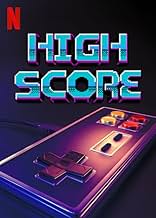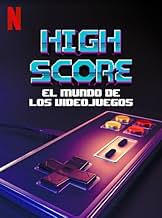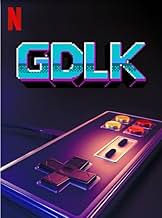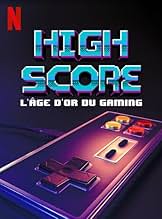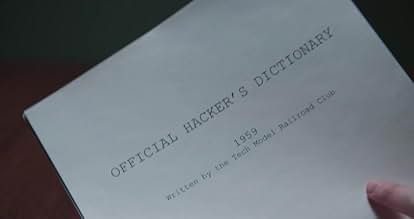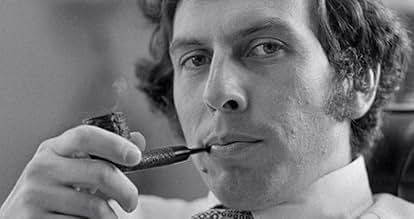VALUTAZIONE IMDb
7,4/10
9223
LA TUA VALUTAZIONE
Con ingegno e forza di volontà, pionieri dei computer e artisti visionari di tutto il mondo hanno creato i mondi emblematici di Space Invaders, Final Fantasy, e molti altri.Con ingegno e forza di volontà, pionieri dei computer e artisti visionari di tutto il mondo hanno creato i mondi emblematici di Space Invaders, Final Fantasy, e molti altri.Con ingegno e forza di volontà, pionieri dei computer e artisti visionari di tutto il mondo hanno creato i mondi emblematici di Space Invaders, Final Fantasy, e molti altri.
- Premi
- 2 candidature totali
Sfoglia gli episodi
Recensioni in evidenza
I'll get the obvious out of the way right up top here: calling "High Score" a "history of video games" is a massive blunder. In no way, shape, or form does this doc attempt any sort of comprehensive look at the game industry. That being said, the simple access to key figures of that very industry makes this an interesting watch for gaming fans/historians.
Somewhat ironically, the biggest hallmark of "High Score" is also, in part, its biggest weakness. It gets access to some of the key figures to ever shape the gaming industry, whether that be Nolan Bushnell (early history), Tom Kalinske (Sega), John Romero (Doom), or Ken & Roberta Williams (adventure gaming). Those names were all enormous movers-and-shakers in the business, and provide first-hand accounts of the behind-the-scenes action.
The problem, however, is that "High Score" takes that access and tries to shape the video game narrative around it. In short, the doc makes the case that this is all the history one needs to know, which is a bit ludicrous. It would have been much better to structure/promote this doc as a series of interviews with industry luminaries and leave it at that.
Each episode here also features an aspect of competitive gaming, which often comes off as a bit odd. Not bad or boring, per se, but just a little strange as to why that angle was pursued so hard in the face of other much more interesting conversations to be had.
Overall, I enjoyed "High Score" just enough to keep watching--no more, no less. Had it been structured differently, it could have been a lot better. But even as-is, the one-on-one interviews with such high-profile figures give it a certain amount of cache.
Somewhat ironically, the biggest hallmark of "High Score" is also, in part, its biggest weakness. It gets access to some of the key figures to ever shape the gaming industry, whether that be Nolan Bushnell (early history), Tom Kalinske (Sega), John Romero (Doom), or Ken & Roberta Williams (adventure gaming). Those names were all enormous movers-and-shakers in the business, and provide first-hand accounts of the behind-the-scenes action.
The problem, however, is that "High Score" takes that access and tries to shape the video game narrative around it. In short, the doc makes the case that this is all the history one needs to know, which is a bit ludicrous. It would have been much better to structure/promote this doc as a series of interviews with industry luminaries and leave it at that.
Each episode here also features an aspect of competitive gaming, which often comes off as a bit odd. Not bad or boring, per se, but just a little strange as to why that angle was pursued so hard in the face of other much more interesting conversations to be had.
Overall, I enjoyed "High Score" just enough to keep watching--no more, no less. Had it been structured differently, it could have been a lot better. But even as-is, the one-on-one interviews with such high-profile figures give it a certain amount of cache.
I am enjoying this documentary. But Netflix and the writers are misrepresenting history in order to shoehorn racial diversity into the documentary.
The section I take issue with is with Jerry Lawson, a black man who is stated to be the "inventor" of the game cartridge. The documentary states that before Lawson became involved, it had "never been done before."
This is just flat out wrong. The swappable ROM cartridge concept was invented by Wallace Kirschner and Lawrence Haskel. Lawson worked on the Channel F game console, the first of its type, but swappable game cartridges had already been invented before he came along. So while it's certain he played a role in the development of an actual marketable, sellable product that used cartridges, it was not his invention, and unfair to the actual inventors to deprive them of their credit.
While I have no problem with Netflix very obviously choosing diverse individuals (transgender, black etc) to fit their well-known diversity mandates, it is NOT cool to twist the facts just to make the narrative work.
For being arguably the most popular hobby since the invention of the television, there are scant few comprehensive documentaries about video games and their rich, immense history. You could easily identify 20 hours of solid historical content for this medium and still leave another 20 hours on the cutting room floor. That is why it is so disappointing that this series spends so much of its precious time on inane crap that you won't care about watching and clear "woke" diversity stuff. Between old clips of 1980s Nintendo gaming tournaments and a major portion of the episode being devoted to a gay video game that absolutely nobody has heard of, this series wastes way too much time on nonsense.
Rather than tell you what is in the series, let me give you a tiny sampling of what is not in it
Every other Atari 2600 era console besides the Atari 2600 Commodore (C64, Amiga) The Dreamcast Fallout The Playstation God games (e.g. Populous, Sim City) Bethesda's RPGs Early experiments with virtual reality Starcraft Age of Empires Thief, MGS, and the rise of stealth The rise of MMORGs like Everquest
Also, anything after the year 2000, which includes: Grand Theft Auto III and the rise of the open world game, The Nintendo Wii, the entry of Microsoft into the console market, the death and rebirth of PC gaming, the rise of user-made content, the explosion in popularity of E3 and its decline, Halo, the list goes on.
What is in here is still surprisingly fluffy and uninteresting compared to some of the other documentaries out there. If you want, for instance, to see an excellent documentary on the early arcade and Atari 2600 era, I highly recommend World 1-1, a great film produced by a couple of amateurs on a shoestring budget that came from crowdfunding.
Rather than tell you what is in the series, let me give you a tiny sampling of what is not in it
Every other Atari 2600 era console besides the Atari 2600 Commodore (C64, Amiga) The Dreamcast Fallout The Playstation God games (e.g. Populous, Sim City) Bethesda's RPGs Early experiments with virtual reality Starcraft Age of Empires Thief, MGS, and the rise of stealth The rise of MMORGs like Everquest
Also, anything after the year 2000, which includes: Grand Theft Auto III and the rise of the open world game, The Nintendo Wii, the entry of Microsoft into the console market, the death and rebirth of PC gaming, the rise of user-made content, the explosion in popularity of E3 and its decline, Halo, the list goes on.
What is in here is still surprisingly fluffy and uninteresting compared to some of the other documentaries out there. If you want, for instance, to see an excellent documentary on the early arcade and Atari 2600 era, I highly recommend World 1-1, a great film produced by a couple of amateurs on a shoestring budget that came from crowdfunding.
Enjoyable series, though totally absent is Amstrad, Spectrum and Commodore for some reason and they played a major role in games long before Nintendo and Sega.
An entertaining series that creates feel good feelings connected to nostalgia and childhood memories.
What let this series down in a big way, was the need to create a narrative that didn't really exist. Focusing on current hot topics such as LGBT, womans rights and race. Whilst important issues in many ways they had no relevance on this platform (pun intended). Celebrating these areas as reasons to why we have the games we have today. When in actuality it always boiled down to what sells. Sadly that is still the case. The creaters of this show are using political agendas to sell their product.
If you can ignore the political statements and accept them for what they are, over indulgent memories. Then what your left with is actually quite entertaining and worth a watch.
What let this series down in a big way, was the need to create a narrative that didn't really exist. Focusing on current hot topics such as LGBT, womans rights and race. Whilst important issues in many ways they had no relevance on this platform (pun intended). Celebrating these areas as reasons to why we have the games we have today. When in actuality it always boiled down to what sells. Sadly that is still the case. The creaters of this show are using political agendas to sell their product.
If you can ignore the political statements and accept them for what they are, over indulgent memories. Then what your left with is actually quite entertaining and worth a watch.
Lo sapevi?
- QuizThe series is narrated by Charles Martinet, who is the voice actor for Mario.
- ConnessioniReferenced in Film Junk Podcast: Episode 764: Bacurau (2020)
I più visti
Accedi per valutare e creare un elenco di titoli salvati per ottenere consigli personalizzati
- How many seasons does High Score have?Powered by Alexa
Dettagli
- Data di uscita
- Paese di origine
- Sito ufficiale
- Lingua
- Celebre anche come
- 高分得勝:電玩的黃金年代
- Azienda produttrice
- Vedi altri crediti dell’azienda su IMDbPro
- Tempo di esecuzione
- 45min
- Colore
Contribuisci a questa pagina
Suggerisci una modifica o aggiungi i contenuti mancanti




